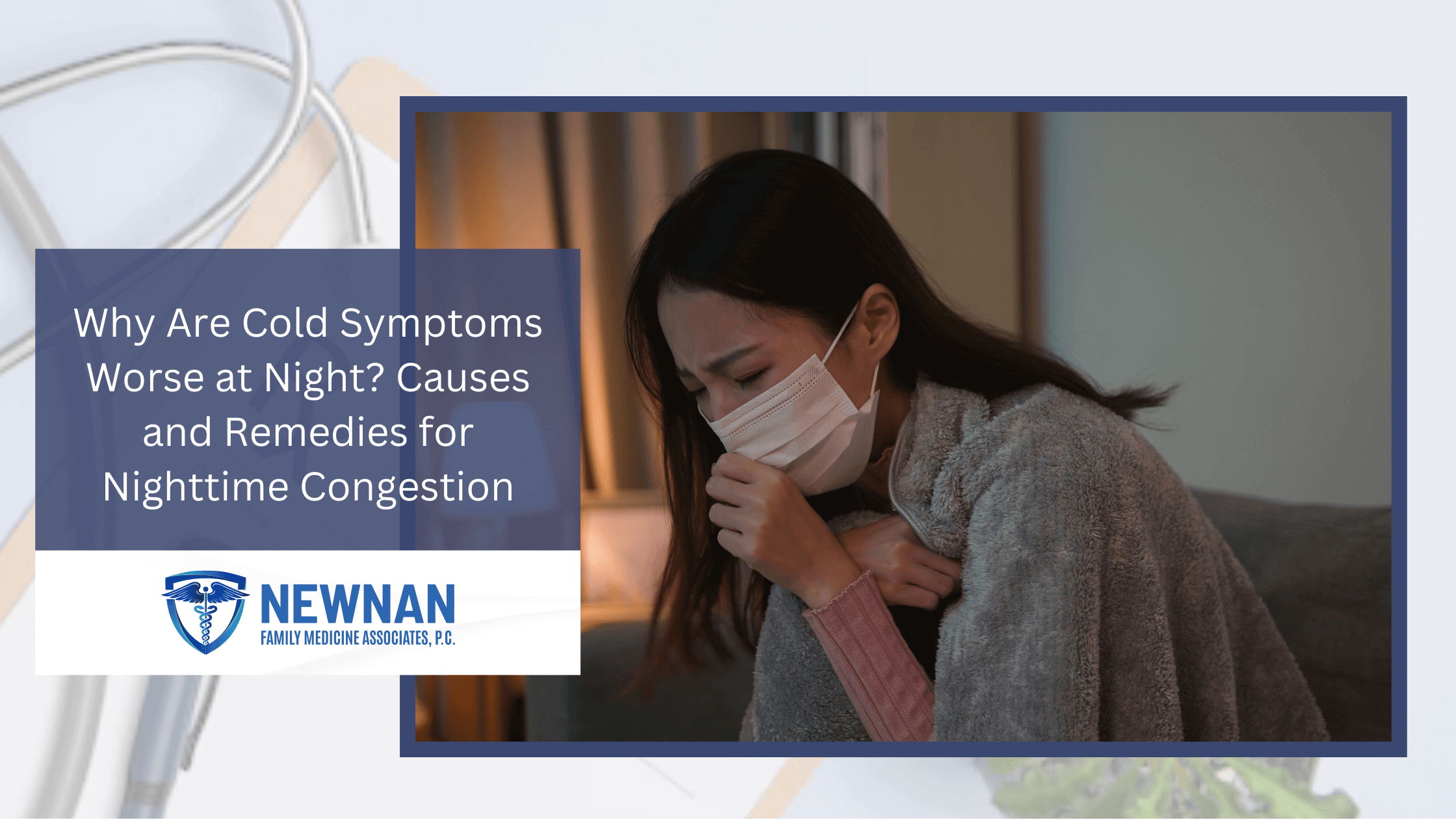Have you ever noticed how your cold symptoms seem to intensify the moment you lie down to sleep? The stuffy nose, scratchy throat, and relentless coughing can make restful sleep feel unattainable. Today we’ll talk about the reasons why cold symptoms worsen at night and offer practical solutions to help you sleep better.
Why are Cold Symptoms Worse at Night?
There are several reasons why cold symptoms worsen at night.
- Body Position and Gravity: When you lie flat, gravity causes mucus to accumulate in your nasal passages, increasing congestion. This position also makes it harder for your sinuses to drain effectively, leading to a blocked nose and greater discomfort. Unlike during the day, when you’re upright and gravity works in your favor, lying down creates a perfect storm for stuffiness.
- Circadian Rhythms and Hormonal Changes: Your body’s circadian rhythm, which regulates your sleep-wake cycle, also affects hormone levels. Cortisol, a hormone that helps reduce inflammation, naturally dips at night. This drop can intensify symptoms like nasal congestion and throat irritation. Lower cortisol levels mean your body is less equipped to manage the inflammation caused by a cold, making nighttime symptoms more severe.
- Dry Air and Environmental Factors: Winter air is typically drier, and indoor heating can strip even more moisture from the environment. Dry air irritates your nasal passages and throat, exacerbating symptoms like congestion and soreness. This dryness can also lead to the formation of crusty mucus, which further blocks your nasal passages and makes breathing even more difficult. Coupled with mouth breathing, which is common when your nose is stuffy, the result is often a dry, scratchy throat that feels worse as the night progresses.
Cold Symptoms at Night Only and Their Impact
Nighttime cold symptoms can significantly disrupt sleep quality. Understanding these symptoms can help in managing them more effectively.
- Stuffy Nose at Night: Lying down often intensifies nasal congestion, as gravity causes mucus to pool in the nasal passages. This makes breathing difficult and can lead to restless sleep.
- Postnasal Drip and Coughing: When mucus drips down the back of your throat, it can trigger a cough reflex, keeping you awake. This postnasal drip is particularly bothersome when lying flat.
- Throat Dryness or Soreness: Breathing through your mouth, common with nasal congestion, dries out your throat and can cause irritation. This dryness often leads to discomfort that feels worse as the night progresses.
Effective Remedies for Nighttime Cold Symptoms
Now let's talk about a few effective ways to counter nighttime cold symptoms.
- Adjust Your Sleeping Position: Elevate your head with extra pillows to encourage mucus drainage and reduce nasal congestion. Sleeping in a slightly inclined position helps prevent mucus from pooling in your sinuses and makes it easier to breathe. This simple adjustment can significantly improve your comfort.
- Use a Humidifier: Adding moisture to the air can soothe irritated nasal passages and prevent throat dryness, especially during the colder months. A humidifier restores humidity to the room, helping to reduce irritation caused by dry air. Be sure to clean your humidifier regularly to prevent the buildup of mold or bacteria.
- Stay Hydrated: Drink plenty of water or warm fluids, such as herbal teas, to thin mucus and reduce irritation. Staying hydrated keeps your mucus thin and less sticky, making it easier for your body to expel. Warm fluids like honey and lemon tea or clear broths can also soothe a sore throat.
- Steam Therapy Before Bed: Inhale steam from a bowl of hot water or take a warm shower to open up nasal passages and relax your body before sleep. The warmth and moisture from the steam help loosen mucus and soothe irritated tissues, making it easier to breathe.
Lifestyle Adjustments to Minimize Nighttime Discomfort
- Avoid Triggers Before Bed: Minimize exposure to allergens, dust, or strong scents that can aggravate congestion. Keeping your bedroom clean and free of potential irritants can help reduce nighttime symptoms.
- Optimize Your Sleep Environment: Keep your bedroom cool and slightly humid. Use hypoallergenic bedding to reduce irritants and consider washing your sheets regularly in hot water to eliminate allergens.
- Establish a Relaxing Nighttime Routine: Wind down with activities like reading or gentle stretching to prepare your body for restful sleep. Avoid screens before bed, as the blue light can interfere with your sleep cycle.
Conclusion
Cold symptoms, including a stuffy nose at night, often worsen due to factors such as body position, circadian rhythms, and environmental conditions like dry air. The pooling of mucus when lying down, combined with hormonal changes that amplify inflammation, explains why colds feel more severe at night. For many, this leads to a stuffy nose at night only, making restful sleep challenging. By implementing practical remedies—like elevating your head, using a humidifier, and staying hydrated—you can ease nighttime congestion and improve your overall comfort.
If you’re struggling with persistent symptoms or finding that remedies aren’t enough, don’t hesitate to seek advice from a healthcare professional.
Proactive and Personalized Preventive Care at Newnan Family Medicine
At Newnan Family Medicine we offer personalized care, including regular screenings and lifestyle guidance, to help you stay healthy and vibrant.
Schedule an appointment for your wellness care and start building a healthier future.


